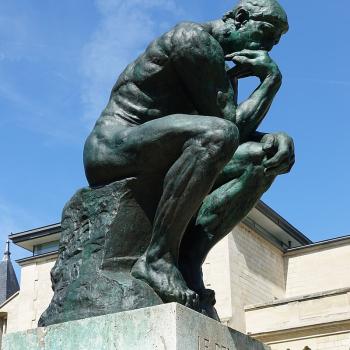Together with the implied presence of a benign authority figure, Brady's songs also gesture toward the gap between the child's understanding and the teacher's. They give voice to the child's perspective, distorted, mistaken or self-centered as it might be. Sometimes Brady is too cute about this, or too on-the-nose. From "Thank Goodness for Grandmas":
My grandmother smiles and tells me
That she was a child once, too;
But she's even older than mother,
So I hardly believe it's true!
But sometimes the child's distortion is both genuinely charming and genuinely perceptive of some aspect of Mormon experience. In "Daddy, Aren't You Glad," the child wrestles with the nature of Mormon identity: is it an innate quality, like the sex of an infant? Is it inherited or chosen? Is it assumed early in life, or at some later point?
Daddy, aren't you glad that I'm a Mormon?
Daddy, aren't you glad I'm just like you?
I bet you used to wonder, 'fore I was even born,
Exactly how I'd look, and what I'd say and do.
And when the nurse said "It's a boy!" I'm sure it pleased you,
For boys are special, so you always say.
Then when you found out I was a Mormon too,
I bet you shouted out "Hip hip hooray!"
If there is a case to be made for artfulness of Brady's vision, I think it lies in her gift for filtering Mormon teachings through the sensibilities and limitations of a child's consciousness—and thus it emerges free from metaphor and enlivened by wonder. In this sense her project is a mimetic one; it undertakes a kind of truthful representation of experience for its own sake, and not merely as a didactic tool.
The great object of Brady's observation is the family, and in particular the super-size families of 8, 9, or 10 children that were not so unusual in the 1970s. She remarks on the unobserved nooks of a child's experience in a super-large LDS family: watching grandparents and older brothers depart for missionary service, attending summer-time family reunions, caring for an infant sibling, getting your hair done before church on Sunday, vying for space on the couch at Family Home Evening. The families in the Brady songbook are replete with grandparents, cousins, aunts and uncles—and with much-older and much-younger siblings. The atmosphere is one of abundance and availability and the sort of centering of social gravity, the sense of belonging that occurs in functional and loving super-large families. I grew up in one of those families, and Brady gets it right.
The subtext of her portrait of the super-large LDS family, of course, is the aggressive natalism of the 1970s church and the political tissue that surrounded mothering and family. Brady treats that issue squarely in what may be her most beloved and most notorious song, "I Want to Be a Mother." The tuneful, supremely singable song has been criticized as indoctrination, pure and simple, and it's a charge that's hard to deny:
When I grow up, I want to be a mother
And have a family,
One little, two little, three little babies of my own.
It presents a sentimental view of motherhood, though perhaps no more sentimental than one would find on any Mormon mommy blog today:
And I will love them all day long
And give them cookies and milk and yellow balloons.
And cuddle them when things go wrong,
And read them stories and sing them pretty tunes.
In my view, though, the song accomplishes more than sugar-coating the pill, though admittedly one must peer quite closely between the lines to retrieve such a reading. The lyrics convey the natalist position of official church counsel, of course: "Four little, five little, six little blessings from above!" They also manage, with supreme economy, to gesture toward the social upheaval surrounding feminism and the ERA: "Of all the jobs, for me I'll choose no other,/ I'll have a family." Yet they also acknowledge the uncertainty and contingency at the heart of reproduction: "When I grow up, if I can be a mother/ How happy I will be." That barbed little "if" goes straight to the heartache of infertility, and to the potential for tragedy that marks every moment of motherhood. And the song acknowledges with a rare forthrightness the narcissism and vanity that are also central to the desire for children: "And you will say each sister and each brother/ Will look a lot like me."
This particular song, I have no doubt, has deeply informed my own sense of self and purpose. I knew it well and sang it often as a child; two of my sisters and I, ages 6, 4 and 2, performed it in matching pinafores at a ward talent show. The song foretold the shape of my life and experience in nearly every particular. I did grow up, and when I did there was no desire stronger than the hunger for babies. I did experience the politicized choice between full-time mothering and career, and indeed I did choose "no other job," though the decision was made pragmatically and not morally. Despite the outrageous bounty of my four precious children, I have felt the sting of that "if"—of the desire for babyflesh denied or deferred. Motherhood has both fed and (I like to think) disciplined my vanity. Even the sugar-frosted vision of cookies and milk, stories and songs, comes quite close to the pleasure, intimacy and joy that my experience as the mother of young children has given me. (It has also given me exhaustion, despair, and fear.) Life offered me one little, two little, three little, four little babies of my own—and how happy I have been.





